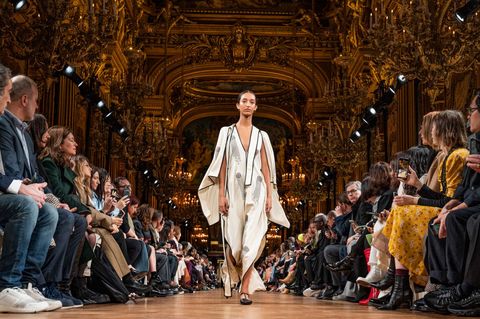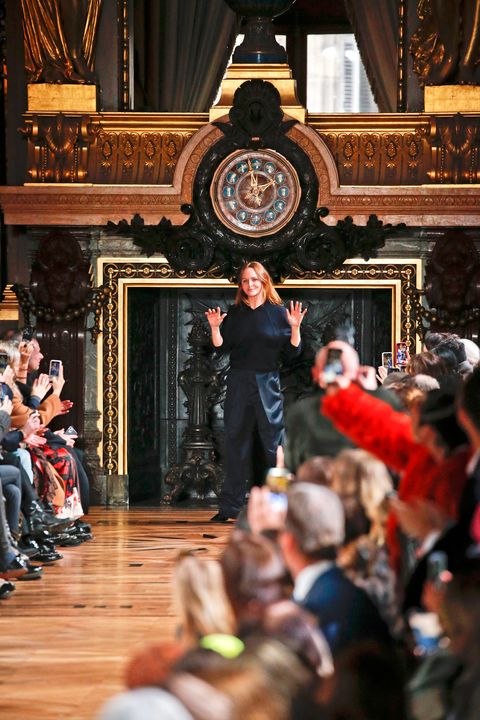Products You May Like
During the height of the pandemic, one of fashion’s foremost eco-warriors found ample reason to be hopeful for the future. As part of ELLE’s look at the future of fashion, Stella McCartney shared why she continues to raise the bar and why sustainability cannot exist without solidarity.
You’ve been a champion of sustainable design from your brand’s inception, but you’re also a luxury brand. Have your ideas about the latter category changed at all during this period?
From day one of my brand, almost 20 years ago, I always knew that if I was going to start this company the only way to do so was if I stayed true to my beliefs. It was important to me to stay informed and make conscious and responsible decisions for both animals and our planet. From the beginning, I never worked with leather, feathers, or furs. There have been many challenges along the way and I know we’re not perfect, we are always striving to do better, but I am proud of being able to show that you can create luxury fashion and desirable accessories in a way that is better for the planet and better for the animals without sacrificing style for sustainability. Innovation is at the core of what we do here. In 2010 we stopped using PVC which is by far the most toxic of all plastics. In 2016 we hit two milestones: we stopped using virgin cashmere and introduced sustainable viscose. Virgin cashmere has about 7 times lower impact than virgin cashmere. Viscose comes from trees, and our sustainable viscose ensures that no deforestation occurs. We are able to map the journey of our ready to wear collections viscose back to its roots in sustainable managed certified forests in Sweden. As part of the autumn 2020 collection, we started using KOBA, which is a new fur-free-fur that is made from plant pulp and recycled polyester and uses around 30% less energy and 63% less carbon emissions. These are just a few of the things we’ve done that I am most proud of which define the modernity of the brand and continue to challenge me.
If anything, this period has only strengthened my belief in the way we work at Stella McCartney and will also push us to challenge ourselves more. We were already working with leftover fabrics from previous seasons for the spring collection when the crisis hit. I already was trying to think differently because I am keen to reduce our impact, our footprint and continue to develop our sustainable practices across all aspects of the business. I hope that this crisis will help my peers in our industry and others see that doing business in this way has its advantages.
Do you foresee the current climate as a period that will help or hinder the sustainability movement? In what ways?
I am always hopeful, I really hope that coming out of the pandemic will bring us all a sense of values. In fashion, sustainability should be a strong focus. Fashion is one of the most polluting industries in the world. For the first time in history during this pandemic we can really measure the damage done by human activity. The equivalent of one garbage truck of textiles is burned or sent to a landfill every second, we can’t sit by and let this continue. I really hope this moment in time causes a turning point. I am realistic, and I know these changes won’t come overnight, I am happy with any slight shifts. I think we would all be doing ourselves a disservice if we don’t come out of this with a conscious outcome. We must stop and consider the waste. We should buy less and buy better. The change is not only going to come from us as an industry but also in consumer behavior–it can be our gift to the planet.
You have a long-running partnership with Adidas. People are certainly embracing comfort more than ever while isolating at home. Do you foresee this trend influencing your main line?
I started the Adidas collaboration in 2004 because I wanted to change what I saw out there. Sports performance clothing for women wasn’t a subject that was really addressed by fashion–there wasn’t much variation in design and I saw that moment as a good opportunity to offer women something they could work out in while feeling great about how they looked. Now sportswear has become a lifestyle choice for women everywhere and is more important than ever. There has always been some connection between my collections with the colors and prints and comfort. With the Adidas collection we are also mindful of making sure the fabrics are made in a sustainable and ethical way, we keep our brand ethos at the forefront while trying to push every angle with technology, manufacturing, and the fashion to try and be as forward-thinking as possible.
The fashion world is coming to realize that operating a truly sustainable business goes far beyond raw materials and includes embracing diverse perspectives. Thoughts?
We cannot have sustainability without solidarity. We can have a positive impact on people and on the planet. It is our responsibility to use our platform to make a difference and we are taking actions to make diversity our reality. This is a turning point. We are seeing there is hope and what we can accomplish when we rise up together.
This interview has been edited and condensed for clarity.
Read More On The Future Of Fashion
This content is created and maintained by a third party, and imported onto this page to help users provide their email addresses. You may be able to find more information about this and similar content at piano.io


